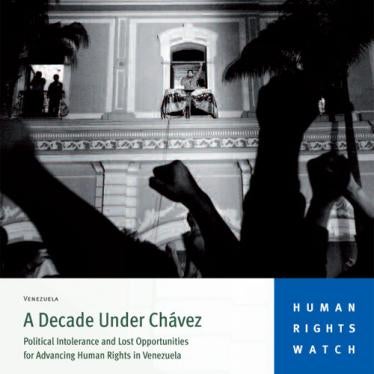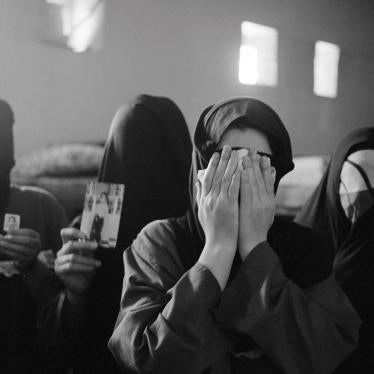In its efforts to counter political opposition and consolidate power, the government of President Hugo Chávez has weakened democratic institutions and human rights guarantees in Venezuela.
The 230-page report, “A Decade Under Chávez: Political Intolerance and Lost Opportunities for Advancing Human Rights in Venezuela,” examines the impact of the Chávez presidency on institutions that are essential for ensuring respect for human rights and the rule of law: the courts, the media, organized labor, and civil society.
“Ten years ago, Chávez promoted a new constitution that could have significantly improved human rights in Venezuela,” said José Miguel Vivanco, Americas director at Human Rights Watch. “But rather than advancing rights protections, his government has since moved in the opposite direction, sacrificing basic guarantees in pursuit of its own political agenda.”
Chávez was first elected in 1998, promising to overhaul Venezuela’s largely discredited political system. The enactment of a new constitution in 1999 offered an extraordinary opportunity for the country to shore up the rule of law and strengthen the protection of human rights. Yet the report finds that this important opportunity has since been largely squandered.
“The most dramatic blow to Venezuelan democracy in the last 10 years was the 2002 coup against Chávez,” said Vivanco. “Fortunately it lasted only two days. Unfortunately the Chávez government has exploited it ever since to justify policies that have degraded the country’s democracy.”
In the absence of credible judicial oversight, the Chávez government has systematically pursued often discriminatory policies that have undercut journalists’ freedom of expression, workers’ freedom of association, and civil society’s ability to promote human rights in Venezuela.
Political discrimination
Discrimination on political grounds has been a defining feature of the Chávez presidency.
The Chávez government has engaged in wide-ranging acts of discrimination against political opponents and critics. At times, the president himself has openly endorsed acts of discrimination. More generally, he has encouraged the discriminatory actions of subordinates by routinely denouncing his critics as anti-democratic conspirators – regardless of whether they had any connection to the 2002 coup.
The courts
Another defining feature of the Chávez presidency has been its open disregard for the principle of separation of powers – and, specifically, the notion that an independent judiciary is indispensable for protecting fundamental rights in a democratic society. After the 2002 coup, the most damaging blow to the rule of law in Venezuela was the political takeover of the Supreme Court by Chávez and his supporters in 2004, which effectively neutralized the judiciary as an independent branch of government. Since the 2004 takeover, the court has repeatedly failed to fulfill its role as a check on arbitrary state action and safeguard of fundamental rights.
The media
The Chávez government has undermined freedom of expression through a variety of measures aimed at reshaping media control and content. Venezuela still enjoys a vibrant public debate in which anti-government and pro-government media are equally vocal in their criticism and defense of Chávez. However, by expanding and toughening the penalties for speech and broadcasting offenses, Chávez and his legislative supporters have strengthened the state’s capacity to limit free speech, and created powerful incentives for critics to engage in self-censorship. It has also abused the state’s control of broadcasting frequencies to intimidate and discriminate against stations with overtly critical programming.
Organized labor
The Chávez government has sought to remake the country’s labor movement in ways that violate basic principles of freedom of association. It has fired workers who exercise their right to strike, denied workers their right to bargain collectively and discriminated against workers because of their political beliefs. Through its systematic violation of workers’ right to organize, the Chávez government has undercut established unions and favored new, parallel unions that support its political agenda.
Civil society
The Chávez government has pursued an aggressively adversarial approach to local rights advocates and civil society organizations. During the Chávez presidency, rights advocates have faced prosecutorial harassment, unsubstantiated allegations aimed at discrediting their work, and efforts to exclude them from international forums and restrict their access to international funding.
The report provides detailed recommendations to the Venezuelan government to reverse the damage done by its policies and to strengthen the country’s human rights protections. These include seeking to restore the credibility of the Supreme Court through a ratification process for all justices who were appointed after the 2004 court-packing law and establishing a new autonomous agency to administer broadcasting frequencies.
“Chávez has actively sought to project himself as a champion of democracy, not only in Venezuela, but throughout the region,” the report observes. However, “Venezuela will not achieve real and sustained progress toward strengthening its democracy – nor serve as a useful model for other countries in the region – so long as its government continues to flout the human rights principles enshrined in its own constitution.”







